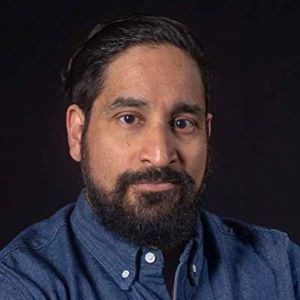Alumni Spotlight: Farooq Ahmed '06

The Alumni Spotlight is a place to hear from the School of the Arts alumni community about their journeys as artists and creators.
Raised in the great state of Kansas, Farooq Ahmed '06 is a graduate of the Columbia University Creative Writing Program and of Brown University, where he studied biochemistry. He is a Contributing Editor for Photonics magazine, and his writing has appeared in the Financial Times, Nature, and The Proceedings of the National Academy of Sciences. His work has been lauded by the South Asian Journalists Association. He lives in Los Angeles.
Was there a specific faculty member or peer who especially inspired you while at the School of the Arts? If so, who and how?
Several professors contributed in innumerous ways to my writing and my understanding of literature. From Ben Marcus, I learned how to view and use language as a tool—how to wield it like a sculptor might a chisel. Binnie Kirshenbaum and Victoria Redel showed me how to construct scenes—literally sentence-by-sentence. Victor LaValle and Sam Lipsyte helped me understand world-building—how to add texture and conflict to the environments in which my characters lived. Together, these lessons continue to inform my writing.
What were the most pressing social/political issues on the minds of the students when you were here?
The terrorist attacks of Sept. 11 happened a few weeks after my graduate school cohort started our MFAs. As one can imagine, it took time for us to regain a sense of normalcy. And many, including myself, questioned the art that we were making, and how best we could interact with the world.
As a brown-skinned Muslim man, it didn’t take long for suspicion and scrutiny to find me. I lived in lower Manhattan at the time, and the NYPD and FBI investigated my apartment; members of the FDNY threatened my life; and fellow New Yorkers paid extra attention whenever I stepped onto the subway or into the airport.
So, it’s fair to say that my perception of the world, as well as its perception of me, altered my writing in ways that took a very long time to comprehend. (Shout out to all those in workshop who suffered through some pretty bad attempts!)
I know many other artists of color who felt the same way at the time, confronting a new unease that was hard to process. Eventually, I channeled a lot of those conflicting emotions into the main character of my recently released novel—envisioning him as a worst-case-scenario fabricated out of the perceptions of Muslim men.
What was your favorite or most memorable class while at the School of the Arts?
One of the perks of attending art school was the opportunity to take courses outside of my division. And while I had memorable workshops and lectures in the writing division, some of my favorite classes were in the film school—particularly Andrew Sarris’ and James Schamus’ seminars. Learning about film from an esteemed critic and producer, respectively, also gave me another way to approach narrative. This has been helpful in writing fiction and in other projects like screenplays.
What advice would you give to recent graduates?
Perhaps because we had spent so much time together in the previous years, many of my graduate school friends and I lost touch after graduation. Slowly, however, we revived those friendships, and they have proven, both personally and professionally, to be one of the best resources that Columbia gave us.
So, I would say: Take time after school to completely break away from the academic cycle and environment. Cleanse yourself of it. Find your art again without the other voices, the workshops, and the critiques. And then, reconnect! Seek those folks who care about you and your work. The outside world will not always care about either, but your friends and colleagues will.